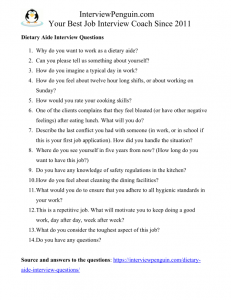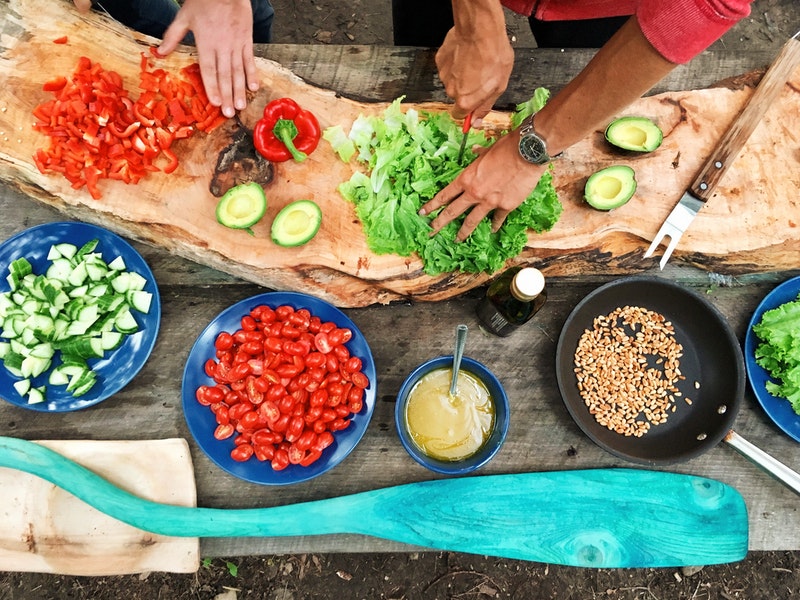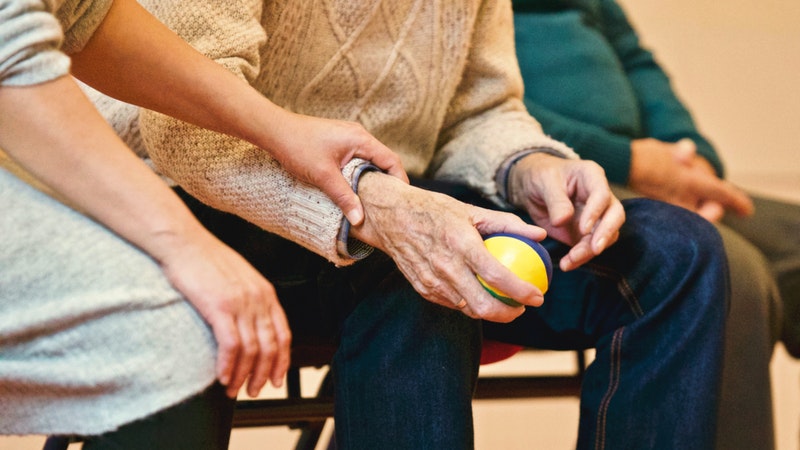We are what we eat and drink. Genetics certainly plays some role, but nutrition often determines how we feel on any given day. For elderly people and patients in hospitals, the role of a proper nutrition (balanced diet that meets their need and suits their health condition) is indispensable.
What’s more, we have food allergy and intolerance, ever more prevalent in Western society. Summarized and underlined, dietitians and dietary aides should have their place in each hospital, retirement home, or healthcare facility. And you will soon become the next one.
In this article I will analyze 13 questions you may get while interviewing for a job of a dietary aide. My analysis should help you with your interview answers. Enjoy.
Table of Contents
Why do you want to work as a dietary aide?
You can talk about the importance of proper nutrition, or about a meaningful purpose you see in this work. Dietary aide is neither the best paid job in the world, nor the easiest one. But you know that it matters, you see the difference you can make in the life of the clients (patients) with your work, and at the end of the day no kitchen can work without aides.
Another alternative is referring to their target group. Perhaps you always enjoyed working with the elderly (or children, depending on your future place of work), and since you do not have a medical or social work degree, you decided to opt for the career of a dietary aide.
Can you please tell us something about yourself?
You need neither degree nor experience to apply for this job. They will typically provide excellent on-site training, and you may be supervised by a licensed dietitian.
For this reason, it doesn’t really matter if you talk about work, education, hobbies, or abilities in your answer.
What matters, however, is your tone of voice and attitude. They should hear some enthusiasm in your voice, some energy. They should get a feeling that you are happy to sit in the office with them, interviewing for a job of a dietary aide, because that is exactly what you want to do for a living–at least at this stage of your professional career. You should not sound desperate…
May also interest you: Guide on how to overcome interview nerves.
How do you imagine a typical day in work?
The most important thing is to mention cooking (assisting with cooking) and cleaning the kitchen. While you may advice clients on proper nutrition and wellness and help with planning the menus and with other interesting duties, the core of your job consists in something else.
Most of the time you will simply work in the kitchen or in the dining areas. Demonstrate realistic expectations with your interview answer. Ensure the hiring managers that you are up for manual labor, and understand all the pros and cons of the job.
How do you feel about twelve hour long shifts, or about working on Sunday?
Clients of retirement homes and patients in hospitals have to eat also on Sunday. And they typically can’t go to a shop or cook their meals, as you can surely imagine.
What’s more, long shifts are quite common in any healthcare facility. You should show some flexibility and understanding for the situation. You won’t work each Sunday, but when you will, some of your colleagues can stay at home and spend time with their families. Next weekend they will pay you back the favor.
Tell the interviewers that you do not mind working on weekends, or doing twelve hour long shifts. You understand that it belongs to this job, and that someone always has to be in the kitchen. On some weekends and holidays it will be you.
How would you rate your cooking skills?
Dietary aide is not a cook, but they may be responsible for preparing basic meals (such as bread and butter and cereals for breakfast, or a cup of afternoon tea :)).
You can label yourself as a decent cook, and elaborate on it with an explanation of your cooking experience. Perhaps you cook for your family back home, or live alone and prepare your meals each day (since you do not enjoy eating processed garbage one can buy in supermarkets or in fast food chains).
Show some confidence in your cooking skills. You will prepare only basic meals and I am sure you will handle that, or quickly learn how to prepare such meals.
* Special Tip: You can also download the list of questions in a one page long PDF, and practice your interview answers anytime later:

One of the clients complains that they feel bloated (or have other negative feelings) after eating lunch. What will you do?
Say that you certainly won’t ignore the situation. You will inquire about any allergies and food intolerance, and ensure that they got the right serving. If they did, you will report their problem to the leading dietitian (or to other responsible healthcare professional).
At this point you should show the interviewers that you understand the limitations of your profession. You can (and often should) monitor the feelings of clients (patients) related to the food they eat, but you should not make any decisions regarding their diet. It is not within your competence as a dietary aide.
Describe the last conflict you had with someone (in work, or in school if this is your first job application). How did you handle the situation?
Conflicts belong to every workplace. When you narrate a conflict, try to speak in a calm voice, and explain what happened. Do not hesitate to admit that you were actually wrong, and the other conflict party was right (if it was the case).
Interviewers should get an impression that you don’t get emotional quickly, and prefer to address conflicts with a cool head. You can also add that you try to act friendly and responsibly towards your colleagues, and always take care of your working duties. Such behavior helps you minimize the number of conflicts you experience at work.
Other questions you may get in your dietary aide interview
- Where do you see yourself in five years from now? (How long do you want to have this job?)
- Do you have any knowledge of safety regulations in the kitchen?
- How do you feel about cleaning the dining facilities?
- What would you do to ensure that you adhere to all hygienic standards in your work?
- This is a repetitive job. What will motivate you to keep doing a good work, day after day, week after week?
- What do you consider the toughest aspect of this job?
- Do you have any questions?
Summary and next steps
Interview for a job of Dietary Aide belongs to easier interviews. Typically you won’t compete with many other applicants for the job, and you won’t face any particularly difficult questions.
At the end of the day they need aides in the kitchen and in the rooms, and hope to hire someone. If you show some enthusiasm and motivation in your interview, and don’t answer their questions with silence (should not happen since you read this article), they will hire you. I wish you good luck!
May also interest you:
- Dietitian interview questions – Some questions may overlap with your interview. Learn how to answer them.
- Home Health Aide interview questions.
- Activity Assistant interview questions.


